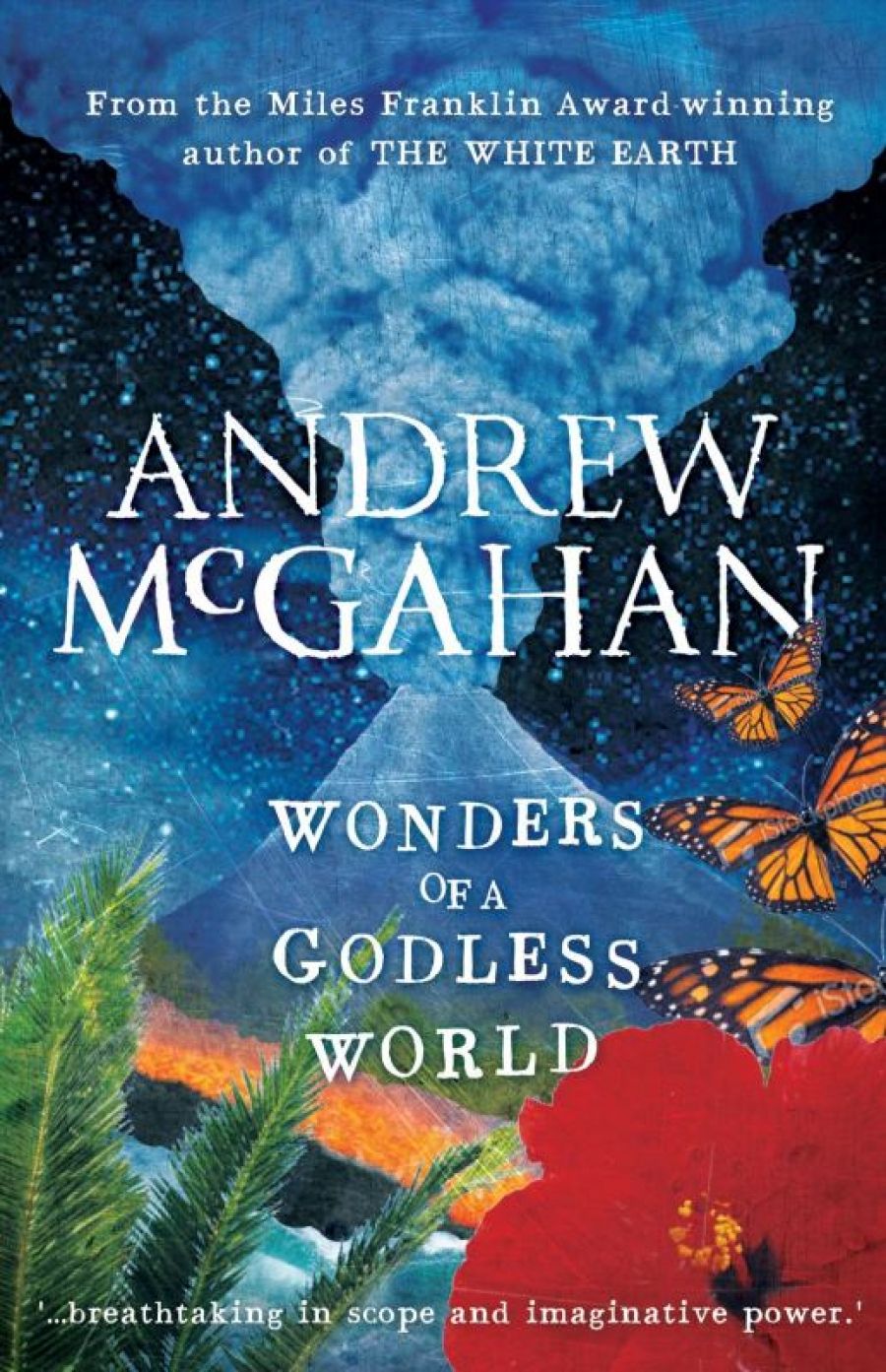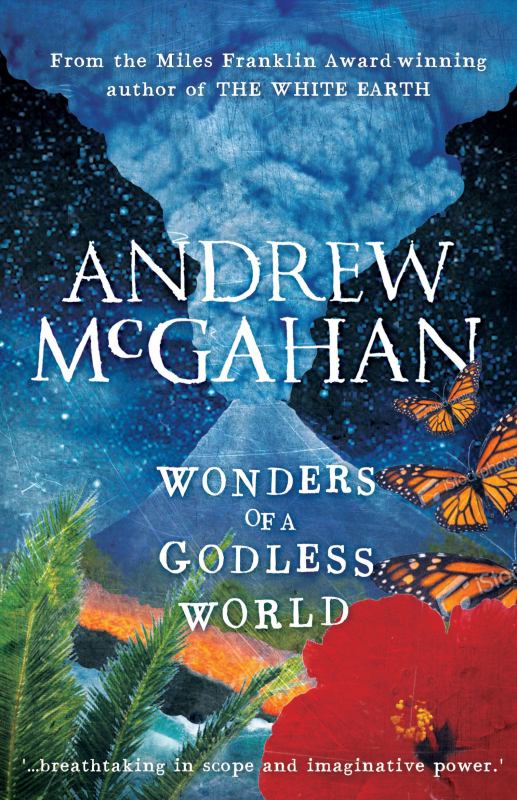
- Free Article: No
- Contents Category: Fiction
- Review Article: Yes
- Article Title: Nameless wonders
- Online Only: No
- Custom Highlight Text:
Every book implicitly asks its reader a question: What am I? Sometimes this is an easy question to answer, but at other times, as with Andrew McGahan’s new novel, one must reply, ‘I have no idea; I’ve never seen anything like you before.’
The setting of Wonders of a Godless World is an old hospital housing the mad. Somehow the old-fashioned notion of ‘madness’ suits this story; it’s the word McGahan uses most often to describe the patients, and there is more than a whiff about this isolated hospital of the medieval Narrenschiff – the Ship of Fools. The hospital is under a volcano on a tropical island with a harbour city. We are not told the names of any of these places, and, like everything and everyone else in this book, its heroine also has no name; rather, she is identified, as are all the other characters, by her defining characteristic, and is thus exclusively referred to as ‘the orphan’. Other key characters are identified by their roles in a mundanely realistic way: the police captain, the old doctor, the night nurse. Still others have labels more redolent of fairytale and myth: the duke, the witch, the archangel, the virgin. And then there is the mastermind and perhaps the villain of the piece: the foreigner. As far as archetypal characters and symbolic settings are concerned, this book contains an embarrassment of riches, and the fact that none of them is individually identified or named means that all kinds of significance can be projected onto them.
- Book 1 Title: Wonders of a Godless World
- Book 1 Biblio: Allen & Unwin, $32.99 pb, 336 pp, 9781741758092
- Book 1 Cover Small (400 x 600):

- Book 1 Cover (800 x 1200):

The setting of Wonders of a Godless World is an old hospital housing the mad. Somehow the old-fashioned notion of ‘madness’ suits this story; it’s the word McGahan uses most often to describe the patients, and there is more than a whiff about this isolated hospital of the medieval Narrenschiff – the Ship of Fools. The hospital is under a volcano on a tropical island with a harbour city. We are not told the names of any of these places, and, like everything and everyone else in this book, its heroine also has no name; rather, she is identified, as are all the other characters, by her defining characteristic, and is thus exclusively referred to as ‘the orphan’. Other key characters are identified by their roles in a mundanely realistic way: the police captain, the old doctor, the night nurse. Still others have labels more redolent of fairytale and myth: the duke, the witch, the archangel, the virgin. And then there is the mastermind and perhaps the villain of the piece: the foreigner. As far as archetypal characters and symbolic settings are concerned, this book contains an embarrassment of riches, and the fact that none of them is individually identified or named means that all kinds of significance can be projected onto them.
The orphan herself cannot take in or remember names, including her own, and cannot speak or understand anything that is said to her, though as a hefty and harmless young woman she is considered a competent housekeeper. In writing an entire novel in which not a single character, place or event is called by its proper name, McGahan seems to have set himself the same kind of task as those who try to write whole short stories without using the letter ‘e’, and the occasionally effortful circumlocutions involved can intrude on the reader’s consciousness at the expense of the story itself.
So we do not know where we are, though we can make a guess. As the foreigner tells the orphan the incredible story of his life – or, rather, his lives – we tentatively recognise the story’s ties to various real places and events: two world wars, a revolution that is probably Russian, a moon landing, a country that sounds a bit like Pakistan and another that is almost certainly somewhere in Africa. As the story progresses, we can put together a chronology of events and are given more and more precise information: the foreigner has lived through the entire twentieth century and beyond, and has been killed and reborn on a number of occasions. The first of these is a landslide in the wake of one of the many earthquakes that took place around the world in 1911 (probably, if the book’s description of the terrain is anything to go by, the one in Tajikistan that created the Usoi Landslide Dam on the Murgab River), and the most recent is easily identifiable as the Columbia Space Shuttle disaster of 2003.
This information is conveyed to the orphan telepathically, for the foreigner has been brought into the hospital in a coma, completely covered in burns, presumably from this most recent space-shuttle death and rebirth. Both he and, increasingly, the orphan have powers that might be regarded as supernatural, or perhaps even as godly: telepathic communication and mind-reading; a form of astral travel and a particularly impressive and powerful kind of telekinesis they can use to call up storms, activate volcanoes and turn comets from their paths. They have superhero powers of which children dream: they can read minds, they can move mountains, they can fly. They even appear to have the gift – if that is what it is – of immortality itself.
It will be clear by now that this book is not going to be to everyone’s taste, but readerly perseverance is rewarded, for the orphan is an unusual and sympathetic character, powerfully drawn, and the mystery of what this story might be ‘really’ about keeps drawing you on throughout it. It is not a difficult read in the way that Brian Castro’s or David Foster’s dizzying pyrotechnics can be difficult, but it is still a bit of a struggle to sort through the levels of reality and realism, such as they are, and the reader is haunted by a sense that she has missed some vital clue. At the risk of giving away too much of the plot, the orphan’s heroic apotheosis seems a fairly unambiguous reference to the story at the heart of Christian belief, but it’s hard to know how to interpret even that, in the context of what has gone before.
In their silent conversations and their spirit travels together, the orphan and the foreigner explore the limits of human knowledge about the earth: they journey inwards to its molten interior, outwards to its moon and beyond, into boundless space. They explore the depths of the sea and the workings of earthquakes and storms; they experience the heat of the earth’s core and the appalling loneliness of the space traveller who looks homeward at that cool, living blue globe in space. There is some suggestion, particularly toward the end, that these fantastic voyages are working on a metaphorical level to suggest the possibilities and limitations of consciousness and imagination itself, and that the orphan must ask herself whether all these experiences are taking place only in her damaged mind.
Much was made of the Gothic elements in McGahan’s award-winning novel The White Earth (2004) – isolation, suffering, the supernatural, madness, violent death, apocalyptic visions and the digging-up of bones, all revolving around an atmospherically spooky and crumbling old building – and all of these things feature again in Wonders of a Godless World. Only at first glance does this novel appear very different from anything McGahan has done before. Not that any of his earlier books bear much superficial resemblance to each other; since the beginning of his career as a novelist, he has shifted from one genre to another, and he has done so again here. But the further you read the more you realise that many ideas and images from The White Earth are revisited here: not only the Gothic conventions and signifiers, but a more general exploration of the nature of humankind’s connection to the earth itself.
Much in this new book relates to humanity’s complex relationship with the earth: to our sense of it as home, to our degree of connection to it, to the destruction we wreak on it and that it wreaks on us. McGahan seems particularly interested in the delicate balance of forces that, tipped a featherweight this way or that, including through careless stewardship and greedy exploitation of the earth’s resources, can unleash unimaginable destruction. There is one particularly scary tale of gold-mining greed bringing down the revenge of the earth upon its head, a story that, though geologically more complex, might still seem strangely familiar to readers who remember the opening scene of The Fortunes of Richard Mahony.
Whatever else it is, this novel is an impressively sustained feat of imagination. And in its open-ended suggestiveness about all kinds of things – human consciousness, history, delusion, power and survival – Wonders of a Godless World activates the reading mind, sending it scrambling after connections and implications, and not so much conveying a message as demanding of readers that they think for themselves about who these characters might represent, and what their story might mean.


Comments powered by CComment